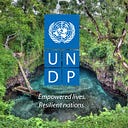Working Together for Gender Equality — the Gender Specialist
Profiling women leaders, making a difference through their work
by Louisa Apelu, UNDP Spotlight Coordinator
Josphine Candiru is no stranger to the work on gender equality. Growing up in a family-oriented environment with six sisters definitely shaped the pathway that led her to the center of the South Pacific. She is passionate about the promotion of gender equality and women’s empowerment, with her skills and expertise in Gender Mainstreaming and Gender Responsive budgeting, capacity building, training and mentorship on gender and Gender-Based Violence (GBV) programming. Josphine has worked with governments and UNDP on gender and development aspects, ranging from the UNDP Uganda Country office, Intergovernmental Authority on Development Regional Initiative Project — Phase II, South Sudan), Ministry of Gender, Labour and Social Development in Uganda, and the Arua District Local Government in Uganda. She is also supporting the UNDP Pacific countries with the set up and implementation of their Gender Seal initiatives.
It was this passion and experience to help other countries drive forward their gender commitments that landed her in Samoa earlier this year. This is Josphine’s first time to Samoa and this part of the Pacific, and she has quickly adapted. Her close network with her Pacific counterparts has helped make her feel at home as she takes up a critical role such as the Subregional Gender Specialist, located in the UNDP Samoa Multi-Country Office. Her technical role puts her in the heart of the Pacific’s GBV programming to support the Samoa, Fiji, Papua New Guinea, Solomon Islands and Timor-Leste Country Offices, and report back to the Bangkok Regional Hub Gender Team and UNDP Spotlight’s Regional Focal Point for the Pacific Region (PNG, Samoa, Timor- Leste and Vanuatu).
Josphine shared that the highlight of her Spotlight journey thus far is the coordination of the Pacific region for improved GBV prevention and response interventions for women and girls especially during the COVID-19 pandemic. The pandemic has widened gender inequalities and revealed that women and girls are not safe in their own homes and communities, and how crucial it is for all of us to join hands to prevent and respond to GBV. Timely reporting and accountability of resources is crucial for value for money. Sharing of best practices among the countries acts as a great platform for lessons learnt for better programming. The Phase II Spotlight Initiative provides opportunity for sustainability of interventions of GBV prevention and response and integration of GBV programming in other sectors.
Sharing some of the work she has experienced so far in Samoa, Josphine testified that there should be strengthened capacity of institutions along the GBV referral pathway to offer better services to GBV survivors, which include the Law and Justice Sector and the Ministry of Women, Community and Social Development. Built capacity of both Government and CSOs on Gender responsive budgeting to ensure that all development interventions ensure that the needs of women and men are planned and implemented with clear budget allocations.
The development of the National Guide to Respond to Survivors of Violence Against Women and Girls for the Law and Justice sector, and the work with the traditional institutions, including the chiefs, is a game changer for social norms change, in addition to the establishment of village safety committees that provide safe spaces for women and girls at the community level. This is also reflected in the support provided to the Samoa Victim Support Group (SVSG) in newly established shelters to accommodate women and their children seeking refuge and support services. The work with small-scaled organisations representing girls and women living with albinism and disability, young women, peer counselling programmes, boys and young men who are victims and perpetrators of violence, SOGI/LGBTQI, non-binary men and women and sex workers prompted inclusion of diversity in GBV prevention and response and strengthening small CSOs to offer services to survivors of GBV.
Josphine reflected with a smile wearing her beautiful sei or flower that: “Women and girls deserve a life free of violence. I am hoping that through my role as the Spotlight Coordinator for the Pacific region, it will lead to strengthened coordination of GBV prevention and response services.” For example, improved GBV referral pathways where girls, boys and women will have equal access to justice, health services, psychosocial support and economic support. Secondly, accelerate transformative social norms change in traditional, religious, and public institutions for gender equality and women’s empowerment and create safe spaces for women and girls. Male engagement, and working with spiritual leadership is key for driving change in the communities with women groups and civil society taking active roles as change makers for women and girls. It is also important for Government and Civil Society organizations to allocate some resources for GBV prevention and response.
-ENDS-
